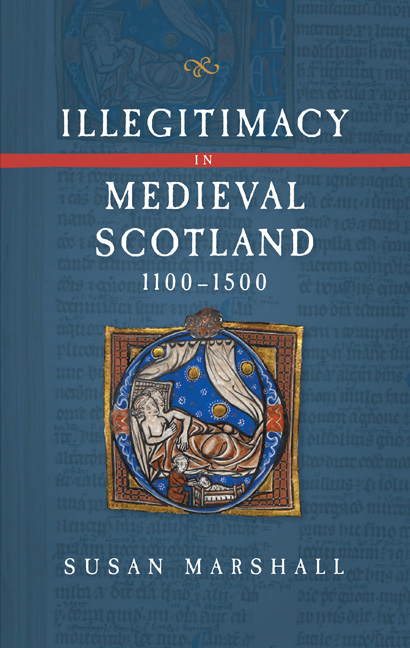Book contents
- Frontmatter
- Dedication
- Contents
- List of Tables
- Preface
- Acknowledgements
- Abbreviations
- Introduction
- 1 Church law and Scottish Families
- 2 Illegitimacy and Inheritance
- 3 Illegitimacy and Royal Succession I: Before the Great Cause
- 4 Illegitimacy and Royal Succession II: from the Great Cause to James I
- 5 Wives, Daughters, and Sisters
- 6 Church Careers and Sacrilegious Bastards
- 7 Illegitimacy in Political Life
- Conclusion
- Appendix I Scottish kings and their illegitimate offspring
- Appendix II Illegitimate sons of Scottish kings
- Timeline of key events
- Bibliography
- Index
4 - Illegitimacy and Royal Succession II: from the Great Cause to James I
Published online by Cambridge University Press: 26 March 2021
- Frontmatter
- Dedication
- Contents
- List of Tables
- Preface
- Acknowledgements
- Abbreviations
- Introduction
- 1 Church law and Scottish Families
- 2 Illegitimacy and Inheritance
- 3 Illegitimacy and Royal Succession I: Before the Great Cause
- 4 Illegitimacy and Royal Succession II: from the Great Cause to James I
- 5 Wives, Daughters, and Sisters
- 6 Church Careers and Sacrilegious Bastards
- 7 Illegitimacy in Political Life
- Conclusion
- Appendix I Scottish kings and their illegitimate offspring
- Appendix II Illegitimate sons of Scottish kings
- Timeline of key events
- Bibliography
- Index
Summary
I wald haue dred to mak ane wrangus are,
To put my realm and peopill in despair
The Scottish succession crisis in the late thirteenth century appears to have put to the test the question of whether kingship and illegitimacy were compatible. Of the thirteen Competitors (fourteen if Edward I's claim is to be included), seven claimed descent from named royal offspring whose illegitimacy, actual or assumed, is not mentioned in their descendants’ petitions (Tables 3 and 4). None was successful.
Robert de Pinkeny asserted that he was a great-great-great-grandson of David I. According to his petition, Pinkeny's great-grandmother had been Marjorie, daughter of David I's son Henry. Duncan describes the claim that Marjorie was a daughter of Henry as ‘an impossibility’ and says it is likely that she was an illegitimate daughter of David, earl of Huntingdon. Only one illegitimate daughter of David is known with certainty: Ada, who married Mael Isu, son of Earl Fer Teid of Strathearn. Although the identities of Marjorie's parents is unknown, there is some evidence that she was an illegitimate royal daughter. Marjorie was granted lands at Elcho by Alexander II for the foundation of a priory, a remarkably generous gift to someone not within the royal kindred, but much less so if she was Alexander II's first cousin, or some other near relation. Marjorie, as Pinkeny claimed, married David de Lindsay (d. bf. 1220), and some evidence suggestive of Marjorie's royal status can be found in the activities of her Lindsay descendants. In 1233 Marjorie's grandson, David (III) Lindsay of Barnweill (d. ca. 1268) made a bequest of 20s annually, in perpetuity, to Balmerino Abbey for the welfare of Alexander II and himself, and for the soul of ‘his lady’, Ermengarde, the late queen of Scots.7 The bequest, made in the immediate aftermath of Ermengarde's death, and to the abbey she herself founded, may be indicative of a family relationship. So too may be evidence that in 1230 Marjorie's son, David (II) Lindsay (d. 1240x1), and another member of the Lindsay family, were overseas in the company of John ‘the Scot’, earl of Huntingdon (d. 1237), son of Earl David.
- Type
- Chapter
- Information
- Illegitimacy in Medieval Scotland1100-1500, pp. 83 - 116Publisher: Boydell & BrewerPrint publication year: 2021



